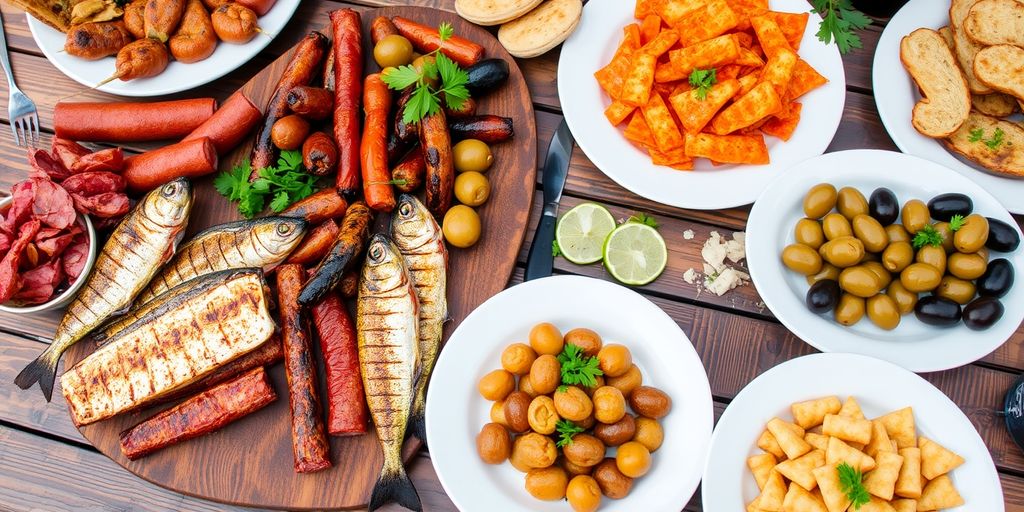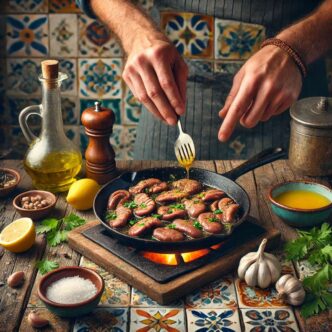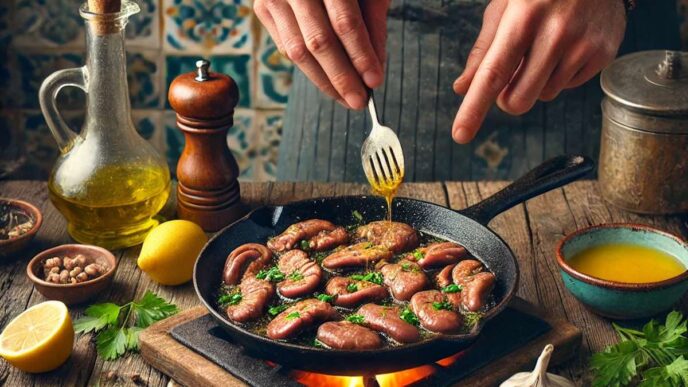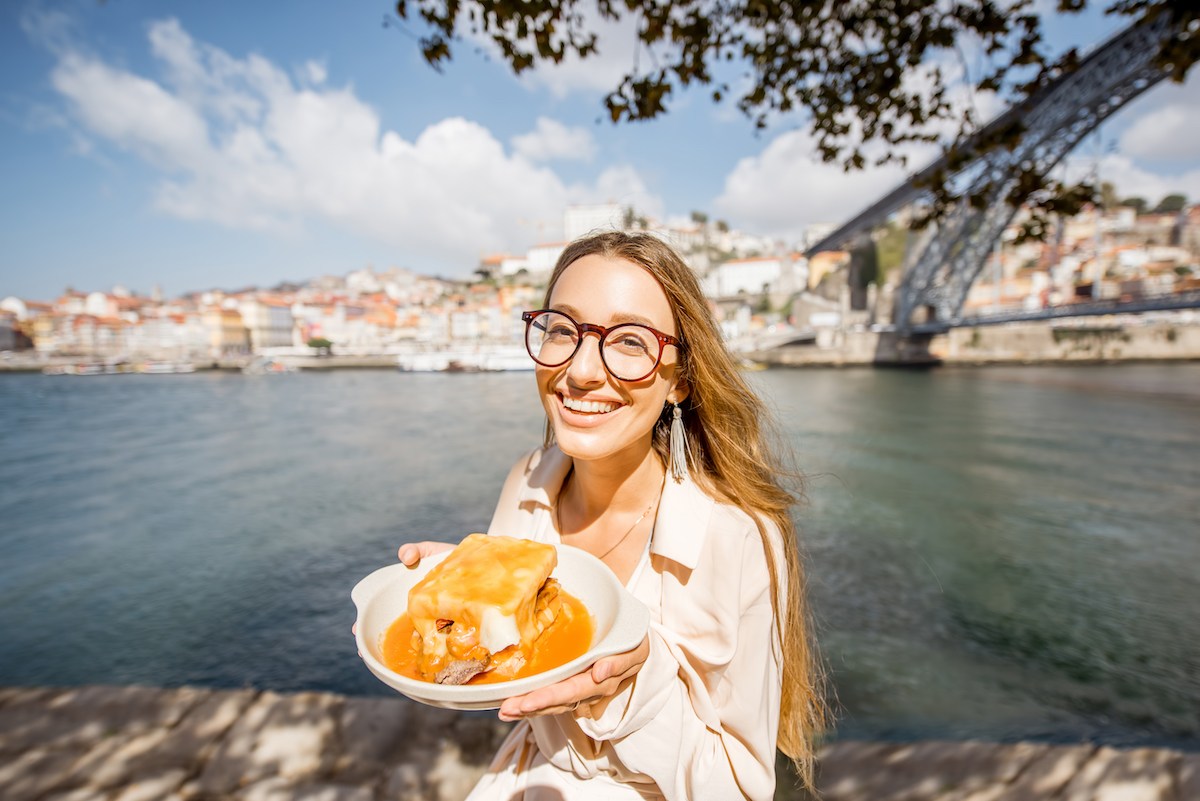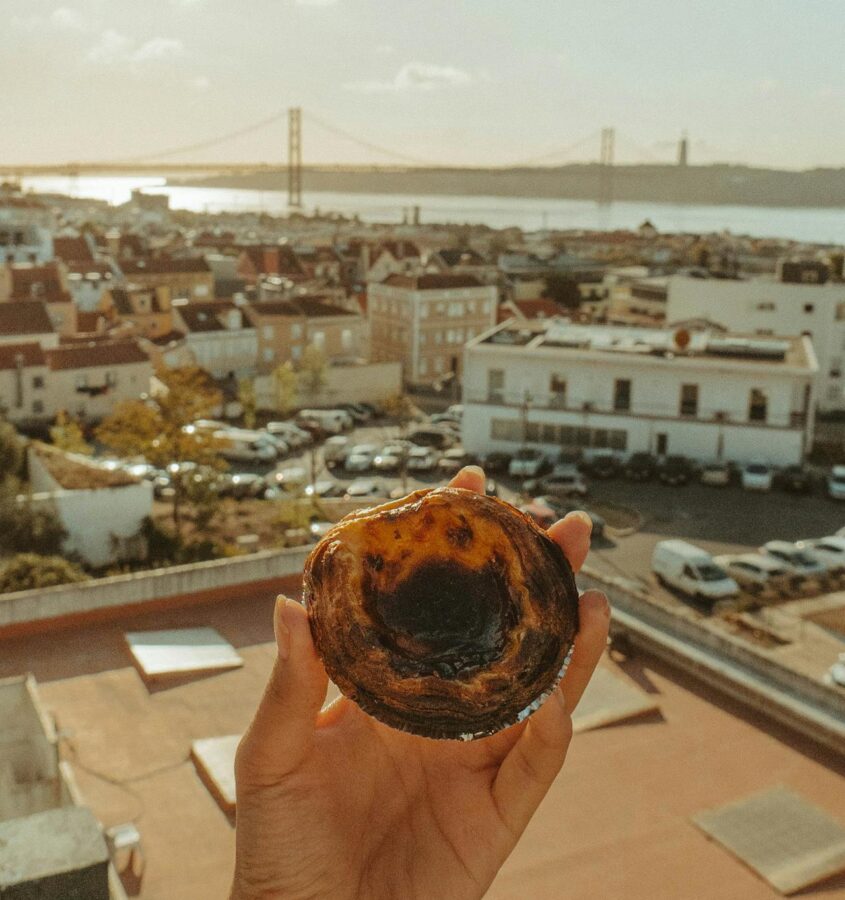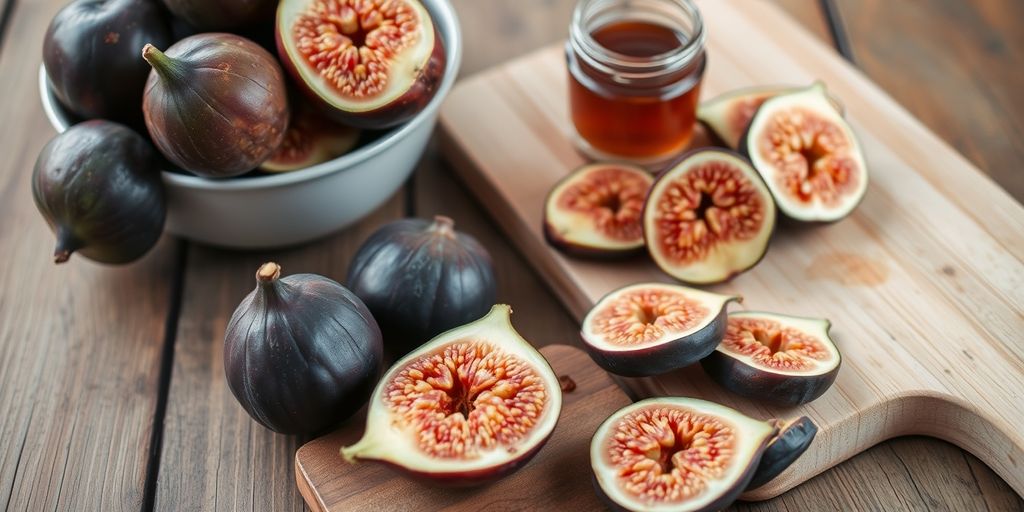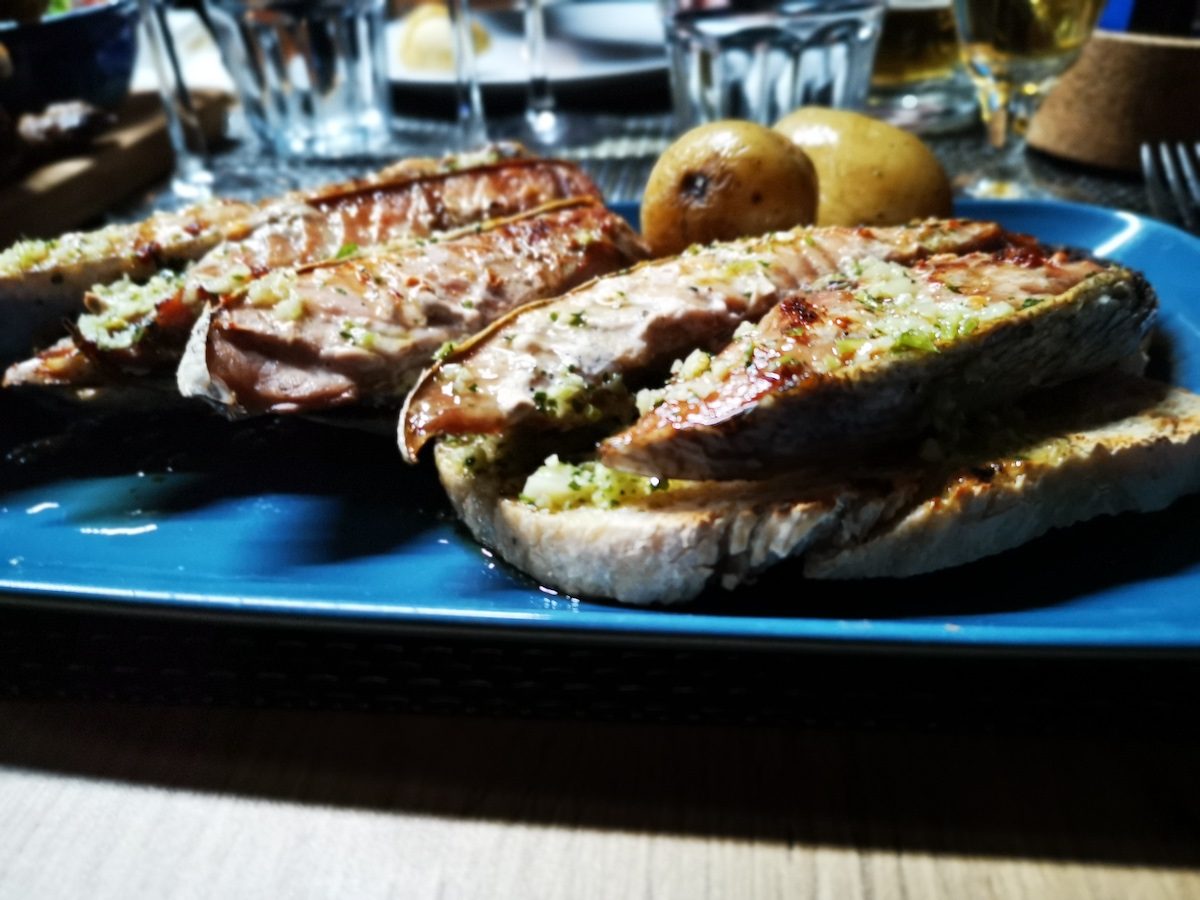Bolo de Bacalhau

Bolo de Bacalhau, also known as codfish cakes, is a beloved Portuguese dish. It’s a perfect example of how versatile bacalhau (salt cod) can be. This dish is simple to make and is often enjoyed as a snack or appetizer.
Ingredients
- 1 pound of bacalhau, cooked and shredded
- 4 eggs
- 1 1/2 cups of flour
- 1 cup of milk
- Salt, pepper, and parsley to taste
- 2 cups of vegetable oil for frying
Instructions
- Prepare the Bacalhau: Start by cooking and shredding the bacalhau. Make sure it is well-desalted before using.
- Mix Ingredients: In a large bowl, combine the shredded bacalhau with the eggs and flour. Add the milk and stir until you get a creamy mixture. Season with salt, pepper, and fresh parsley.
- Rest the Batter: Let the mixture rest in the fridge for at least one hour. This helps the flavors meld together.
- Heat the Oil: Heat the vegetable oil in a sturdy, deep pan to 360°F (180°C). Maintaining this temperature is crucial for the best results.
- Fry the Cakes: Drop heaping tablespoons of the batter into the hot oil, frying no more than 3-4 at a time to avoid overcrowding. Fry for about two minutes per side, or until golden brown and cooked through.
- Serve: Remove the cakes from the oil and let them drain on paper towels. Serve immediately for the best texture.
Bolo de Bacalhau is a delightful way to enjoy one of Portugal’s most iconic ingredients. Whether you’re new to Portuguese cuisine or a seasoned fan, these codfish cakes are sure to impress.
Rissol

Rissóis are small, fried pastries that can be enjoyed either hot or cold. They come in two main varieties: shrimp (rissóis de camarão) and meat (rissóis de leitão). Here, we’ll focus on the shrimp version.
Ingredients for the Dough
- 300g wheat flour
- 50cl water
- 2 tablespoons butter
- Salt
Ingredients for the Stuffing
- 500g shrimp
- 1 onion, finely chopped
- 2 cloves garlic, minced
- 2 tablespoons butter
- 2 tablespoons flour
- 15cl water
- Salt and black pepper
Ingredients for Frying
- 4 eggs, beaten
- 300g breadcrumbs
Preparation of the Dough
- Bring a pan of water, salt, and butter to a boil. Once boiling, remove from heat and add the flour, stirring until the mixture pulls away from the sides of the pan. Set aside to cool.
Preparation of the Stuffing
- Sauté the chopped onion and minced garlic in butter over low heat until they start to brown.
- Add the shrimp and cook until they turn pink. Remove from heat and let cool slightly.
- Mix in the flour and water, stirring until the mixture thickens. Season with salt and black pepper.
Assembling the Rissóis
- Roll out the dough on a floured surface and cut into circles.
- Place a spoonful of the shrimp mixture on each circle and fold the dough over, sealing the edges with a fork.
- Dip each rissol in the beaten eggs, then coat with breadcrumbs.
- Fry in hot oil until golden brown. Drain on paper towels and serve.
Rissóis are a must-try Portuguese dish you can’t miss. They are perfect for any occasion, whether as an appetizer or a main course. Enjoy these delightful pastries and experience the rich flavors of Portugal.
Croquete

Croquetes are a beloved Portuguese snack, often enjoyed in cozy taverns and petisqueiras. These tasty morsels are made from a mixture of meat, usually beef or pork, combined with creamy béchamel sauce, then breaded and fried to golden perfection. They are a staple in Portugal’s better answer to tapas: petiscos, offering a heartier and more diverse option than their Spanish counterparts.
Ingredients
- 1 lb ground beef or pork
- 1 cup béchamel sauce
- 1 small onion, finely chopped
- 2 cloves garlic, minced
- Salt and pepper to taste
- 1 cup breadcrumbs
- 2 eggs, beaten
- Oil for frying
Instructions
- Prepare the filling: In a pan, sauté the onion and garlic until soft. Add the ground meat and cook until browned. Mix in the béchamel sauce and season with salt and pepper. Let it cool.
- Shape the croquetes: Take small portions of the meat mixture and shape them into small logs or balls.
- Bread the croquetes: Dip each croquete in the beaten eggs, then roll in breadcrumbs until fully coated.
- Fry the croquetes: Heat oil in a deep pan. Fry the croquetes in batches until golden brown. Drain on paper towels.
- Serve: Enjoy hot or at room temperature, perfect for sharing with friends and family.
Croquetes are a delightful part of the petiscos tradition, emphasizing communal dining and fresh ingredients. They are perfect for any gathering, bringing a taste of Portuguese hospitality to your table.
Conclusion
Exploring the world of Portuguese petiscos is like embarking on a culinary adventure filled with rich flavors and delightful surprises. These small, tasty dishes are perfect for sharing with friends and family, making any gathering special. Whether you’re enjoying classic favorites like bolinhos de bacalhau and rissóis de camarão or trying something new like pica-pau, petiscos offer a unique taste of Portugal’s vibrant food culture. So, gather your ingredients, invite your loved ones, and start cooking these delicious recipes at home. You’ll not only satisfy your taste buds but also create lasting memories around the table. Happy cooking!
Frequently Asked Questions
What are Portuguese Petiscos?
Petiscos are small, flavorful dishes from Portugal, similar to Spanish tapas. They are meant for sharing and are often enjoyed with drinks like beer or wine.
What is Bolo de Bacalhau?
Bolo de Bacalhau, also known as codfish cake, is a popular Portuguese petisco made from salted cod, potatoes, onions, and parsley, formed into small cakes and fried until crispy.
What ingredients are used in Rissol?
Rissol is a half-moon-shaped pastry filled with a creamy mixture of shrimp or other fillings like meat or fish. The pastry is breaded and fried until golden brown.
What is a Croquete?
A Croquete is a small, cylindrical snack made from ground meat that is seasoned, coated in egg and bread crumbs, and then fried to a crispy perfection.
How do you serve Petiscos?
Petiscos are typically served in small portions on shared plates. They are often enjoyed with drinks and are perfect for social gatherings.
What drinks go well with Petiscos?
Petiscos pair well with a variety of drinks, including cold beer, Portuguese red wine, and the light and refreshing Vinho Verde.
Can Petiscos be vegetarian?
Yes, some Petiscos can be vegetarian. For example, Peixinhos da Horta are green beans battered and fried, similar to tempura.
Where can I try authentic Petiscos?
Authentic Petiscos can be enjoyed in Portuguese taverns and cafes, especially those in the backstreets of Portugal. They are also available in some Portuguese restaurants abroad.

